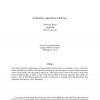Free Online Productivity Tools
i2Speak
i2Symbol
i2OCR
iTex2Img
iWeb2Print
iWeb2Shot
i2Type
iPdf2Split
iPdf2Merge
i2Bopomofo
i2Arabic
i2Style
i2Image
i2PDF
iLatex2Rtf
Sci2ools
AIM
2000
2000
Probabilistic Algorithms in Robotics
This article describes a methodology for programming robots known as probabilistic robotics. The probabilistic paradigm pays tribute to the inherent uncertainty in robot perception, relying on explicit representations of uncertainty when determining what to do. This article surveys some of the progress in the field, using in-depth examples to illustrate some of the nuts and bolts of the basic approach. Our central conjecture is that the probabilistic approach to robotics scales better to complex real-world applications than approaches that ignore a robot's uncertainty. This research is sponsored by the National Science Foundation (and CAREER grant number IIS-9876136 and regular grant number IIS-9877033), and by DARPA-ATO via TACOM (contract number DAAE07-98-C-L032) and DARPA-ISO via Rome Labs (contract number F30602-98-2-0137), which is gratefully acknowledged. The views and conclusions contained in this document are those of the author and should not be interpreted as necessaril...
AIM 2000 | AIM 2006 | Contract Number | Grant Number | Probabilistic |
Related Content
| Added | 17 Dec 2010 |
| Updated | 17 Dec 2010 |
| Type | Journal |
| Year | 2000 |
| Where | AIM |
| Authors | Sebastian Thrun |
Comments (0)

